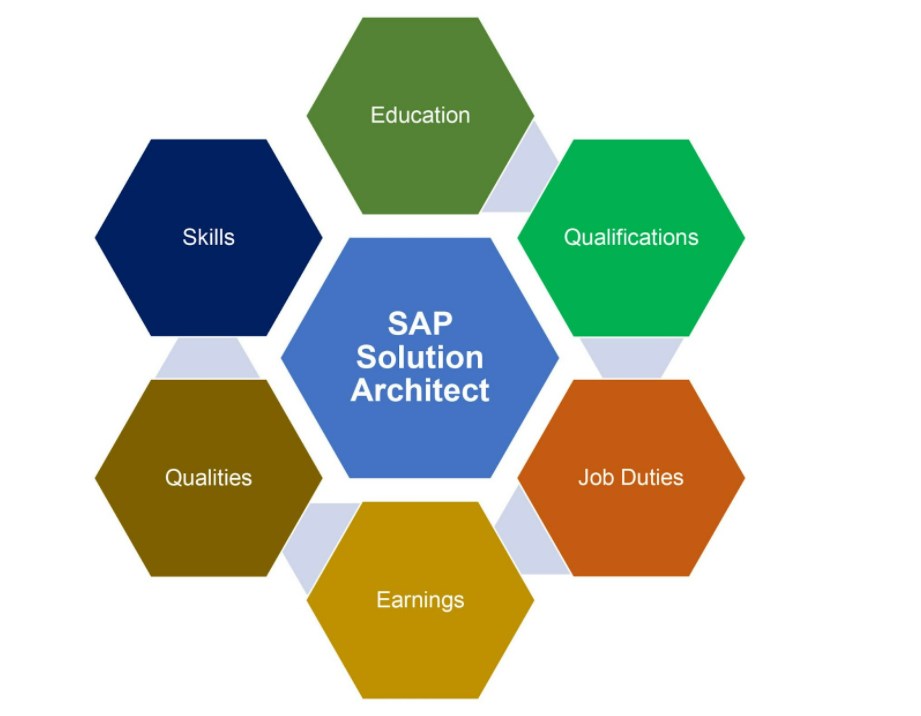In a typical SAP S4/HANA implementation, a solution architect aligns, orchestrates the company’s business process, and makes sure that the system is used to its full capability based on customers’ requirements. The solution architect’s second most crucial role is defining the integration points within SAP’s domains and non-SAP.
The career path of an SAP Solution Architect demands exceptional technical skills expertise with a particular area of SAP platform, software design, and an excellent understanding of how multiple SAP solutions interact with each other along with their specific roles in a business. SAP Solution Architects belong to a highly specialized subdomain under the broad umbrella of SAP consultancy.
This article will introduce you to an SAP Solution Architect’s functions, job duties, and skill requirements. But, first, let’s start with knowing who SAP Solution Architects are and what they do.

Table of Contents
What does an SAP Solution Architect do?
An SAP Solution Architect is a person who outlines and guides the implementation of SAP solutions. The solution architect’s job is to clearly understand the customer’s requirements and plan the customizations within the SAP solution to match the customer’s needs.
To better comprehend the job role, you can think of what an architect does to a building. Similar to an architect, an SAP Solution architect also designs the implementation plan in detail, follows up regularly with the implementation team, and makes necessary adjustments along the way to ensure the project’s success.
Let’s now take a closer look at the job duties of an SAP Solution Architect.
What is the job description of an SAP solution architect?
SAP Solution Architect typically remains in charge of detailing blueprints of SAP solution implementation plans. The job responsibilities involve the following critical tasks:
- Architecting solutions: This is more related to aligning the business process. In SAP S4/HANA, understanding the A solid solution architect in SAP will define the entire flow between the integrated domains such as finance and materials management, SD and Finance, or PM and finance.
- See the big picture: Their unique combination of understanding the business process and the system’s technical functionality allows the solution architect to be in a position to clarify expectations and be the liaison between the functional consultants, business analysts, and the technical consultants.
- Communicating with clients: Understanding the issue and fully translating it from SAP geeky world to non-SAP speakers distinguishes average solution architects from real gurus.
- Involvement in multiple stages: Depending on the nature of the business and where the solution architect is regarding the project implementation, the role can have various flavors where the solution architect can be in functions specific to pre-sales, go-live, post-go-live, support, and hyper-care. Solution architects are like music conductors, maneuvering between different SAP aspects and leading the role with deep solution knowledge.

- Solution integration: A business may need to subscribe to multiple SAP solutions and non-SAP ones. It is the role of the solution architect to design the integration plan.
What Is The Difference Between an SAP Solution Architect and An SAP Project Manager?
Although several aspects of the job duties of an SAP Solution Architect overlap with the ones related to an SAP Project Manager, they do not essentially play the same role. The project manager’s task is more versatile in terms of the project’s administrative, managerial and financial activities and less technical in detailed planning.
For instance, an SAP Project Manager has to calculate a project’s ROI, set the project’s activities and estimates accordingly, and finally report it to the top management. It is also the project manager’s job to specify the performance metrics of the team members and the project tasks. Additionally, ensuring the project milestones, meeting the deadlines, and managing the logistics are responsibilities of the project manager.
In contrast, a solution architect is more concerned with the technical side of the design and architecture itself to match the client’s requirements. A solution architect analyses the issue by digging deep into SAP tables, seeing where the problem is coming from, suggesting an enhancement or an exit fix it, and aligning all the domains to flow smoothly without hiccups.
Now let’s come to the critical point – which qualifications do you need to become an SAP Solution Architect.
What Are The Qualifications of an SAP Solution Architect?
Educational Qualifications and Experience
Although a university degree is not essential to get this role, and in my opinion, real, versatile, and intensive SAP experience will be 100 times more powerful than having a piece of paper. That said, having a BS or MS in computer science, engineering, or a relevant field opens the first door of being in SAP. So having a university degree is a must. At the same time, your knowledge and understanding of the business domain are critical, and hence an MBA may also be helpful.
In general, 10-15 years of professional experience in technical consultation, system integration or application architecture is needed to apply for most SAP Solution Architect positions.
Technical Knowledge Or Deep Skills from SAP Ecosystem
The most fundamental element you will need to become an SAP Solution Architect is your knowledge and understanding of the SAP ecosystem. There are tens of thousands of customized solutions under the SAP domain categorized in different business categories, and it is impossible to master all of those. Instead, a solution architect obtains a general understanding of as many solutions as possible and specializes in few.
You can begin with a particular area, and then with career progression, you may move on to other solutions to add to your portfolio. For instance, you may start as an MM/SD consultant, a Finance consultant, or a technical consultant/ABAPer and walk your way through the domains.
One thing is sure, there is no way you can understand any of this without real industry experience, and there is absolutely no way you can be an architect without putting in real hard work. Passion, here, is the key.
Non-SAP Technical Skills
As an SAP Solution Architect, you will have to use non-SAP tools. Therefore, knowledge of the following areas will be advantageous:
- External services in the areas of data analytics, integration, and intelligence, such as Azure, AWS, Google Analytics;
- Java Connectors, Rest APIs, and similar interfaces and web services;
- Other ERP Systems, forms, and survey management systems.
Certifications
Although real-life expertise, on-the-job learning, and essential skills are what matters at the end of the day. However, certifications related to the SAP field can strengthen your resume significantly. Make sure to explore SAP’s official certification website and find the areas of solutions that suit you the most. Data science and data analytics certification from Amazon, IBM, or Google is also something for you to consider.
So we have talked quite a bit about technical skills, but how about the qualities and soft skills?
What Are The Qualities and Soft-Skills of an SAP Solution Architect?
To excel in your career as an SAP Solution Architect, you will need the following soft skills and qualities:
- The most important one is to explain the SAP rough language to non-SAPers with ease.
- Great communication ability;
- Presentation skills with story-telling;
- Skills to express complicated matters in simple terms to clients;
- Team coordination;
- Attentive listening;
- Attention to detail.
Here is something for fun. Suppose you liked playing lego building blocks, jigsaw puzzles, or detailed simulation games like SimCity in your childhood. In that case, you might enjoy working as an SAP Solution Architect, as the job involves a great deal of detail-level designing.
SAP Solution Architect’s salary
The outcome of this challenging path is rewarding, with very high employment demand and attractive earning potentials in a vast industry that is set to grow even further in the coming years. There are opportunities for both remote and onsite work. According to Glassdoor, several companies offer USD150-200 per hour for contractor jobs as SAP Solution Architects. The average base salary is approximately USD 180,000 per annum for full-time onsite positions in the US. For professionals with more specialized integrated solutions like SAP MM, SD, FICO, SAP Ariba Spend Management Solution, the base pay per annum may quickly exceed USD 250,000.
Concluding Note
Millions of businesses are using SAP solutions, and the number is growing further. So your opportunities will be sky-high if you have the proper determination. The career offers a lot of flexibility and options for you to explore so that you can find the right track.
What if you are looking for a career start option within the SAP ecosystem, with more career paths to choose from as you progress? Becoming an SAP Consultant is where you need to start.
- Overview of the Material Master in SAP S/4HANA - January 2, 2024
- SAP FICO TRANSACTION CODES (MOST COMMON) - December 24, 2023
- Best SAP S/4HANA MM Books for Beginners and Advanced Learners - November 25, 2023





0 Comments